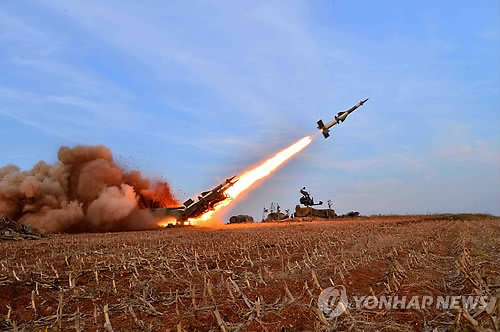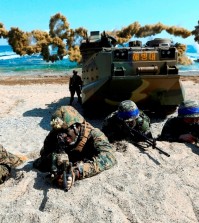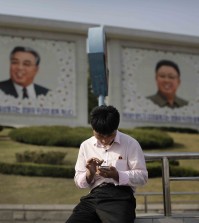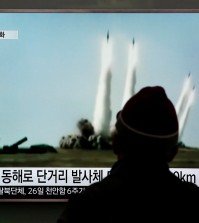- California Assembly OKs highest minimum wage in nation
- S. Korea unveils first graphic cigarette warnings
- US joins with South Korea, Japan in bid to deter North Korea
- LPGA golfer Chun In-gee finally back in action
- S. Korea won’t be top seed in final World Cup qualification round
- US men’s soccer misses 2nd straight Olympics
- US back on track in qualifying with 4-0 win over Guatemala
- High-intensity workout injuries spawn cottage industry
- CDC expands range of Zika mosquitoes into parts of Northeast
- Who knew? ‘The Walking Dead’ is helping families connect
N. Korea threatens to strike South “without notice” via fax
By Kim Eun-jung
SEOUL, Dec. 20 (Yonhap) — North Korea has threatened to strike South Korea in response to conservatives’ anti-Pyongyang rallies here on the second death anniversary of its leader Kim Jong-il earlier this week, the defense ministry here said Friday.
The North’s National Defense Commission on Thursday sent a fax to South Korea’s National Security Council through the western coastal military hotline to threaten to strike the South “without any notice.”
The latest threat came after several conservative groups and North Korean defectors on Tuesday held rallies in Seoul to protest against North Korea’s authoritarian rule and human rights abuse, with some burning Kim Jong-un’s photo.
The North Korean military condemned the rallies, saying they insulted North Korea’s “highest dignity,” and vowed to “ruthlessly retaliate” against the South. It was referring to its young leader, believed to be around 30, who had recently ordered the execution of his uncle Jang Song-thaek to consolidate his grip on power.
The South Korean defense ministry immediately replied through the military line, vowing to “sternly react” to any provocations, ministry spokesman Kim Min-seok said. “We are closely monitoring the North Korean military’s moves, preparing to sternly react to any provocations,” Kim said, noting the North has not shown unusual movement so far while carrying out its routine winter drills since early December.
North Korea has a long history of bellicose rhetoric, regularly threatening strikes against South Korea and the United States, often in response to their joint drills particularly in spring.
Last week, South Korean Defense Minister Kim Kwan-jin said the communist state may launch provocations between late January and early March as hardliners may try to demonstrate their loyalty amid growing instability, ordering a tight security posture for his military.
The South Korean capital city of Seoul, with more than 10 million people, is within the range of North Korea’s conventional artillery positioned along the heavily fortified border.
Pyongyang severed the communication line in March amid heightened tensions on the Korean Peninsula following the North’s third nuclear test and its near-daily war threats. The two Koreas restored the western coastal hotline in September after they agreed to resume their joint industrial park in a North Korean border town of Kaesong.
Following the shocking execution of North Korea’s unofficial No. 2, President Park Geun-hye ordered officials to study ways to revive the secretariat of the National Security Council to cope with the changing security situations on the peninsula.
















